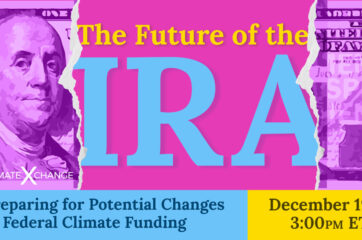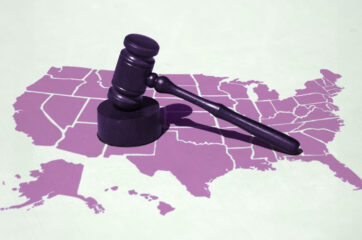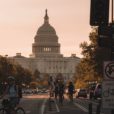On September 9th, the Commodity Futures Trading Commission’s Climate-Related Market Risk Subcommittee released a report entitled Managing Climate Risk in the U.S. Financial System. Spurred by similar efforts across the globe, this report was initiated to measure climate risk to the American financial system and provide recommendations to mitigate that risk. Members of the subcommittee included representatives from financial markets, the banking and insurance sectors, agricultural and energy markets, data and intelligence service providers, the environmental and sustainability public policy sector, and academic disciplines focused on climate change, adaptation, public policy, and finance.
Our October Deep Dive Webinar was led by Bob Litterman, the Chairman of the Climate-Related Market Risk Subcommittee in conversation with Leonardo Martinez-Diaz, Global Director of the Sustainability Finance Center at the World Resources Institute, Jasmine Sanders, the Executive Director of Our Climate, and Adele Morris, Senior Fellow at the Brookings Institute. The group of climate advocates discussed the real-world implications of the report and how frontline communities were particularly harmed by climate risk.
Perspective of the Chairman
As the former head of the Quantitative Resources Group in Goldman Sachs Asset Management, Bob Litterman had been on more than a few risk committees. “In my experience,” Litterman said, “The risk committee has a trump card. When it says that we have a problem, no one says that it’s not a priority right now. No one says that we’ll come back to that later. The risk committee has the authority and the agency.”
Time is of the essence more than ever. The IPCC Special Report released in 2018 warned the world that we had 12 years to limit the worst impacts of climate change. Litterman shared this need for urgency. He said, “Time is a scarce resource when you are managing risk…When you run out of risk, that’s when a risk can become a tragedy.”
It is the role of a financial risk committee not to mitigate risk, but to identify it and make sure that it is quantified appropriately. In Litterman’s opinion, that is the component that is missing from the way the United States is tackling climate change right now. We are not appropriately accounting for the negative externalities that are created with each ton of carbon emitted. “When risks aren’t priced appropriately… that can lead to catastrophe.” This becomes particularly pertinent as the Trump Administration has undervalued the cost of carbon by 7x.
Every day that we fail to take meaningful action to reduce carbon emissions, we increase warming by an unknown margin. We are beyond the point where we can make small, incremental changes. We need to slam on the brakes.
This well-established urgency led to the 34 committee members from various industries putting aside partisanship and unanimously supporting this report. Everyone on the committee understood the seriousness that climate change poses to the United States.
How can we turn the tide on carbon emissions?
“Capital flows in the direction of the incentives, and unfortunately today that is in the wrong direction. Capital is flowing toward the existing economy based on fossil fuel generated energy, and it does not take into account the externalities. So emissions continue to go up globally.” Litterman believes that we need to change the direction of the incentives by pricing carbon appropriately so that capital begins to flow towards clean energy instead.
And the tipping point for the United States to implement a price on carbon might be closer than you think. There is precedent across the globe for other countries making the shift to appropriately incorporate externalities into the price of carbon. 16 European countries have already implemented a carbon price and several Asian countries are in discussions to implement carbon trading mechanisms as well.
The barrier in the United States has been the polarization of climate change. Litterman remarks, “Now I’ve talked to many Republicans and many of them know [climate change] is real, it’s caused by humans, and that the problem is that we are not pricing emissions. And yet they are afraid to speak out, because in the past those who have spoken out have been primaried, and there has been dark money that has caused them to lose their position.”
Ted Halstead, founder of public policy center, New America, and president of the Climate Leadership Council believes that we need a Republican jailbreak: more than one Republican to come out at the same time and support climate legislation that has a high probability of passing. Litterman believes that after the election the winning bill could be for carbon pricing. This was the number one recommendation of the report.
What are some specific recommendations to the financial sector?
Leo Martiniez-Diaz also served on the Climate-Related Market Risk Subcommittee and emphasized that although carbon pricing was the number one recommendation of the report, there were about 60 other recommendations concerning the financial sector that revolved around two principles: how can we protect the financial sector from climate risk and how can the financial sector be a part of the solution.
Martiniez-Diaz highlights three recommendations that he finds particularly important. First, he notes the recommendation concerning the Financial Stability Oversight Council (FSOC), a body consisting of all of the major financial regulators in government created after the 2008 financial crisis. Its responsibility is to flag for Congress risks that are coming for the financial sector. This recommendation in the report urges this council to put forward climate change as a financial risk and to encourage Congress to begin the research and action needed to stop the climate risk from becoming a crisis.
The second highlighted recommendation looks at climate risk stress testing. Typical risk stress testing asks businesses, insurance companies, banks etc. to examine how a list of scenarios would affect their financial health and demonstrate how they are prepared to handle these shocks. The report recommends that all institutions begin to undergo this testing specifically for climate scenarios, even ones that wouldn’t normally undergo this analysis like agricultural, community banks, and non-systemically important regional banks.
Finally, Martiniez-Diaz underscores the importance of businesses disclosing their climate risks, so that markets can appropriately react. This disclosure needs to be consistent, and investors need to be educated about how climate risk affects their investments in order for the appropriate market shift to occur.
World Resources Institute is a global research organization that spans more than 60 countries, with offices in the United States, China, India, Brazil, Indonesia and more. Our more than 1,000 experts and staff work closely with leaders to turn big ideas into action to sustain our natural resources—the foundation of economic opportunity and human well-being. Our work focuses on seven critical issues at the intersection of environment and development: climate, energy, food, forests, water, cities and the ocean.
Complex and Exacerbated Climate Risks for Frontline Communities
As the Executive Director of Our Climate, Jasmine Sanders, reminded us all that, “When we talk about climate risk, it is important to know that they are all intersecting and disproportionately impacting frontline communities. These communities include communities of color, coastal communities, low-income communities.” It is also imperative to include in the conversation issues around food insecurity, housing, migration, and racial and sociocultural issues as well.
New Orleans after Hurricane Katrina is a critical example of the intersectional and complex losses that come with a climate-related disaster. The estimated cost of Hurricane Katrina according to NOAA is $161 billion. However, that statistic only tells a part of the story.
Recovery funds have flowed into tourist areas such as Canal Street and the French Quarter, but other areas of the city were left to fend for themselves. Mental and physical trauma lingered after the storm and many were forced to flee to other cities. Many never returned, and the culture and spirit of New Orleans has never fully rebounded. This is the first example of climate migration in the United States.
“When we read reports letting us know that climate impacts are estimated to cost the world $7.9 trillion by 2050, I want us to think about what it is costing the individual and the family unit. How do we mentally prepare for unsurvivable storm surges? This is the rawness of climate change. It’s not just happening in a foreign country where you can’t fathom it. It’s happening here in your very own backyard.”
Because of this complexity, Sanders stresses that there is no “one size fits all” solution for climate change. There will need to be a suite of policies. At Our Climate, they support a carbon price, referenced as a “corporate polluter fee.” OC is rooted in three policy principles: renewable energy targets, a corporate polluter fee, and environmental justice legislation.
Our Climate is supporting several pieces of federal legislation this upcoming session including: the Energy Communities Resilience Act, which prioritizes frontline communities for clean energy microgrid grants, the THRIVE Agenda, which recognizes the duty of the federal government to implement an agenda to Transform, Heal, and Renew by Investing in a Vibrant Economy, and the Environmental Justice for All Act, which would restore, reaffirm, and reconcile environmental justice and civil rights.
Additionally, Our Climate is focused on supporting nature-based solutions. Examples included restoring coral reefs and mangrove belts, protecting forests and wetlands, and bringing nature into cities.
“Climate change is known in some circles as a threat multiplier, increasing steadily and resulting in the exacerbation of existing stressors. It’s the threat we know about and are constantly learning more about each day simply because the intensity of it is escalating. Yet only about 40% of Americans are actually talking about it at the dinner table.”
Again and again in different states we see examples of how the changing climate is causing disasters with fires in the West, hurricanes in the Southeast, and increased climate migration. At this moment where we are facing multiple crises across the country, we all need to speak up, because the planet cannot speak for herself.
Activism can take many different forms. Calling and meeting with legislators, posting on social media, writing an op-ed, and just talking with friends and family. “There is power in multiple solutions, and there is power in your voice.”
Our Climate mobilizes and empowers young people to educate the public and elected officials about science-based, equitable climate policy solutions that build a livable world. They train their student leaders to assess climate policy according to their Policy Principles, which focus on three core areas: renewable energy targets, corporate polluter fees and environmental justice legislation. Over the past year, Our Climate has celebrated four state wins: Climate Leadership & Community Protection Act in New York, Climate Pollution Limits Bill in Washington, Oregon’s Executive Order to cut emissions across the state, and most recently, the 2050 Roadmap Climate Bill in Massachusetts. Over the next 3-5 years, OC is looking to grow their organizational budget to $2.5 million, diversify their revenue streams, strengthen their staffing capacity to at least 50 staff and continue to expand across the United States, have OC staff and students present on the international stage via TedTalks and UN Conventions and produce several visual media projects. Our Climate is the catalyst for young people becoming visionaries, activists and leaders in their own communities. Support our youth climate leaders today!
What do these risks look like on the ground?
Adele Morris was also a member of the Climate-Related Market Risk Subcommittee and worked on the final report. She highlights two case studies that demonstrate how the financial risks in the report function in real world scenarios.
Risks in the report fall into three buckets: physical, litigation, and transitional. These transitional risks are the ones that come into play with climate policy and a resulting change in consumer preference.
The fires in California are a compelling example of the physical risk that increases with climate. 4.1 million acres in the state of California has burned, which is more than twice the previous record in the area. Morris points out that with climate change exacerbating disasters, you cannot look to past years to calculate what the next few years will look like. A forward looking risk analysis is needed to appropriately assess new risk.
Furthermore, according to Cal Fire, 3 million homes in California are in “severity zones” for fires, which depresses the value of houses in these areas, and subsequently increases the price of insurance. If homeowners are unable to obtain insurance for their home, they will not be able to get a mortgage, which creates a ripple effect throughout various financial sectors.
With the ramping up of climate policies and a modest carbon price, the Energy Information Administration predicts that within 5 years, coal production from the Powder River Basin will drop by 90%. Not only is this devastating for the coal industry and employees, but also it increases the risk of economic collapse of these coal reliant communities. If municipal governments in these areas lose their primary source of tax revenue, how will they be expected to pay off debt from municipal bonds?
When coal reliant communities were asked to report their climate risks, they did not factor the transitional risks of losing revenue from the coal industry and the impact that would have on the local economy. This ties back into Martiniez-Diaz’s point that institutions need to appropriately value their climate risk.
The Brookings Institution is a nonprofit public policy organization based in Washington, DC. Our mission is to conduct in-depth research that leads to new ideas for solving problems facing society at the local, national and global level. Brookings brings together more than 300 leading experts in government and academia from all over the world who provide the highest quality research, policy recommendations, and analysis on a full range of public policy issues. The research agenda and recommendations of Brookings’s experts are rooted in open-minded inquiry and our 300+ scholars represent diverse points of view. Research topics cover foreign policy, economics, development, governance and metropolitan policy.
What are the key takeaways?
The financial sector at large is taking climate risk remarkably seriously and urging the federal government to follow its lead. This is critical given the complex ripple effects climate impacts have across all industries, some less evident than others.
Furthermore, climate change is a threat multiplier and for frontline and environmental justice communities that means exacerbating intersectional burdens already increased by the pandemic.
What’s clear is that despite political dispute and partisanship across the board on climate change, the financial community is sounding the alarm that climate risks are real, and we need to start acting on them yesterday.








